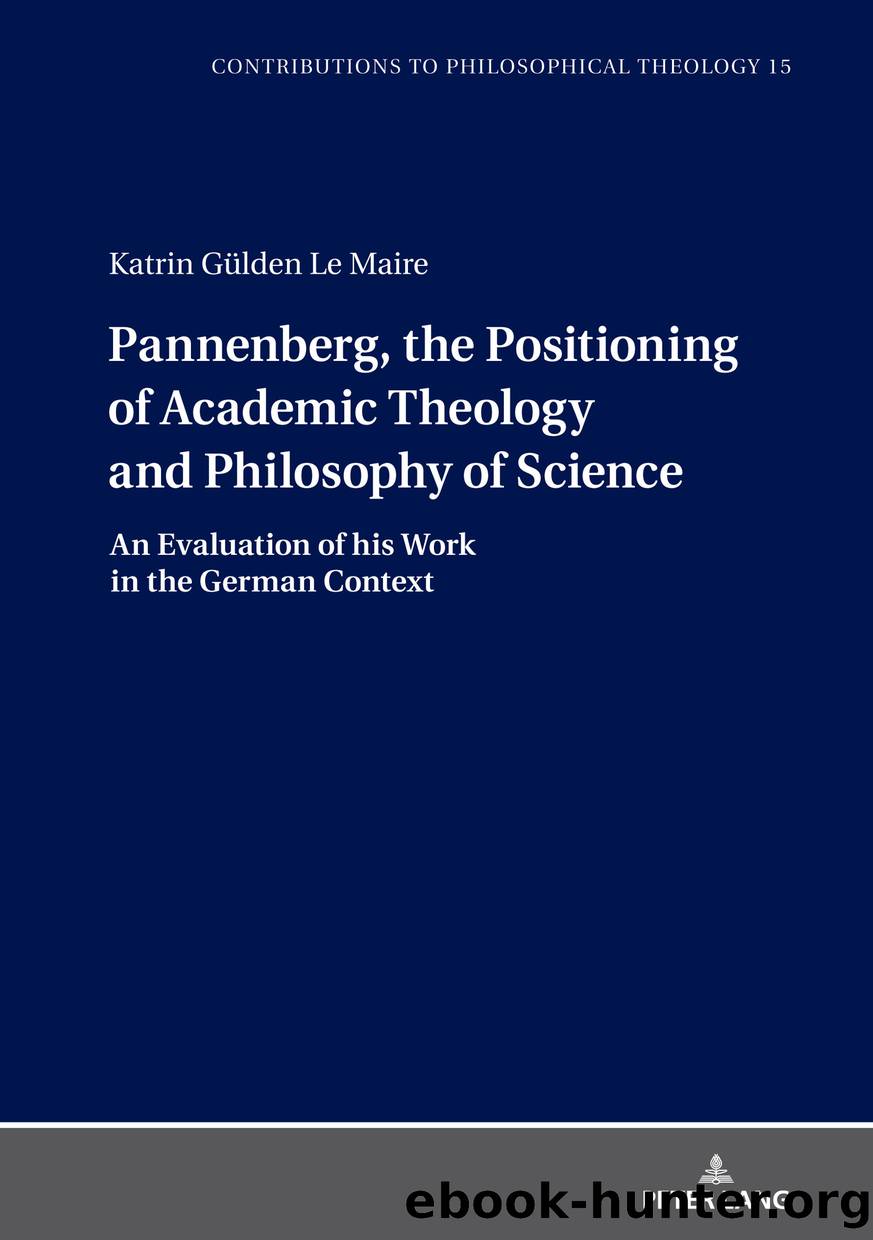Pannenberg, the Positioning of Academic Theology and Philosophy of Science by Katrin Glden Le Maire;

Author:Katrin Glden Le Maire;
Language: eng
Format: epub
Publisher: Peter Lang Group
Polk also voiced awareness of it749 and further rare insight came from Peterson who dealt with the existence of theology at (US-American) universities:
The issue of theologyâs presence in the university may seem far removed from matters of the field of science and theology, but reflection shows that the two issues are inevitably intertwined.750
In Germany, select theologians meanwhile sought and continue to clarify the unity of the theological subjects and their university status due to the scientific-political relevance of syllabus composition, yet mainly without reference to either Pannenberg or the book.751 Nüssel referred to the scientific-political reasons behind it by pointing to the successive overall implementation of the humanities into cultural studies in the 1970s as the reason for the increasing complexity and lack of clarity of the methodological basis for the classification of theological subjects.752
Pannenberg, in contrast, followed, in assignment if not in thought, Schleiermacher753 in this last chapter of Wissenschaftstheorie, in that he proposed a categorization and structure for the individual theological subjects, as well as outlining their perceived tasks.754 Indeed, he considered that the content of theological subjects had always been historically shaped, in the sense that theologians could study theology as a science of God and its subject (God) â155 | 156âonly ever indirectly through the study of religion. Moreover, the subjects were not merely meant to be historical but also dealt with the question of the truth of religious phenomena and the reality of God. Thus, he posed two important requirements for each subject: first, theology would not just have to be historical but also true and systematic.755 For him, this essence of truth was essentially systematic; reflections concerned with truth, therefore, had to be systematic in order to conform to the unity of truth and in accordance with all truths amongst each other. Theology and its sub-disciplines had, consequently, to be systematic theology if theologians claimed the subject to be true in terms of its religious content transmission.756 Pannenberg demonstrated âconvincinglyâ757 how every theological discipline, i.e., biblical exegesis and historical theology, biblical theology, church history, systematic theology and practical theology, could prove to be theological. Further, he pleaded that each sub-subject had to expose its motives for its autonomization (spin-off). Otherwise, theological subjects only existed in order to legitimize the logistical faculty set up.758 He aimed for a theology of religion which took seriously the religionsâ claims to truth, testing how well they illuminated reality. This did not need to be dogmatic, he insisted, because the question of the true religion was still disputed.759 He extensively outlined this concept, its potential foundational and systematic function, Yet, he also pointed out its limitation in that:
The general study of religion should not be restricted to the description of human religious experiences, its context concerning other experiences and its institutionalization within the human life context. Rather, it should enquire about the experienced reality within the religious life and history [of a person]. Such a question is blocked upfront, if in the sense of the more recent times privatization
Download
This site does not store any files on its server. We only index and link to content provided by other sites. Please contact the content providers to delete copyright contents if any and email us, we'll remove relevant links or contents immediately.
Verus Israel: Study of the Relations Between Christians and Jews in the Roman Empire, AD 135-425 by Marcel Simon(551)
Infocracy by Byung-Chul Han(539)
Caesar Rules: The Emperor in the Changing Roman World (c. 50 BC â AD 565) by Olivier Hekster(530)
Europe, Strategy and Armed Forces by Sven Biscop Jo Coelmont(477)
Banned in the U.S.A. : A Reference Guide to Book Censorship in Schools and Public Libraries by Herbert N. Foerstel(444)
Reading Colonial Japan by Mason Michele;Lee Helen;(443)
The Roman World 44 BC-AD 180 by Martin Goodman(436)
Give Me Liberty, Seventh Edition by Foner Eric & DuVal Kathleen & McGirr Lisa(436)
DS001-THE MAN OF BRONZE by J.R.A(421)
The Dangerous Life and Ideas of Diogenes the Cynic by Jean-Manuel Roubineau(417)
The Oxford History of World War II by Richard Overy(414)
Introducing Christian Ethics by Samuel Wells and Ben Quash with Rebekah Eklund(412)
american english file 1 student book 3rd edition by Unknown(411)
Imperial Rome AD 193 - 284 by Ando Clifford(408)
Basic japanese A grammar and workbook by Unknown(389)
Literary Mathematics by Michael Gavin;(373)
Language Hacking Mandarin by Benny Lewis & Dr. Licheng Gu(352)
How to Reach the 9.0 in IELTS Academic Reading by IELTS Medical(333)
The Oxford History of the Renaissance by Campbell Gordon;(331)
